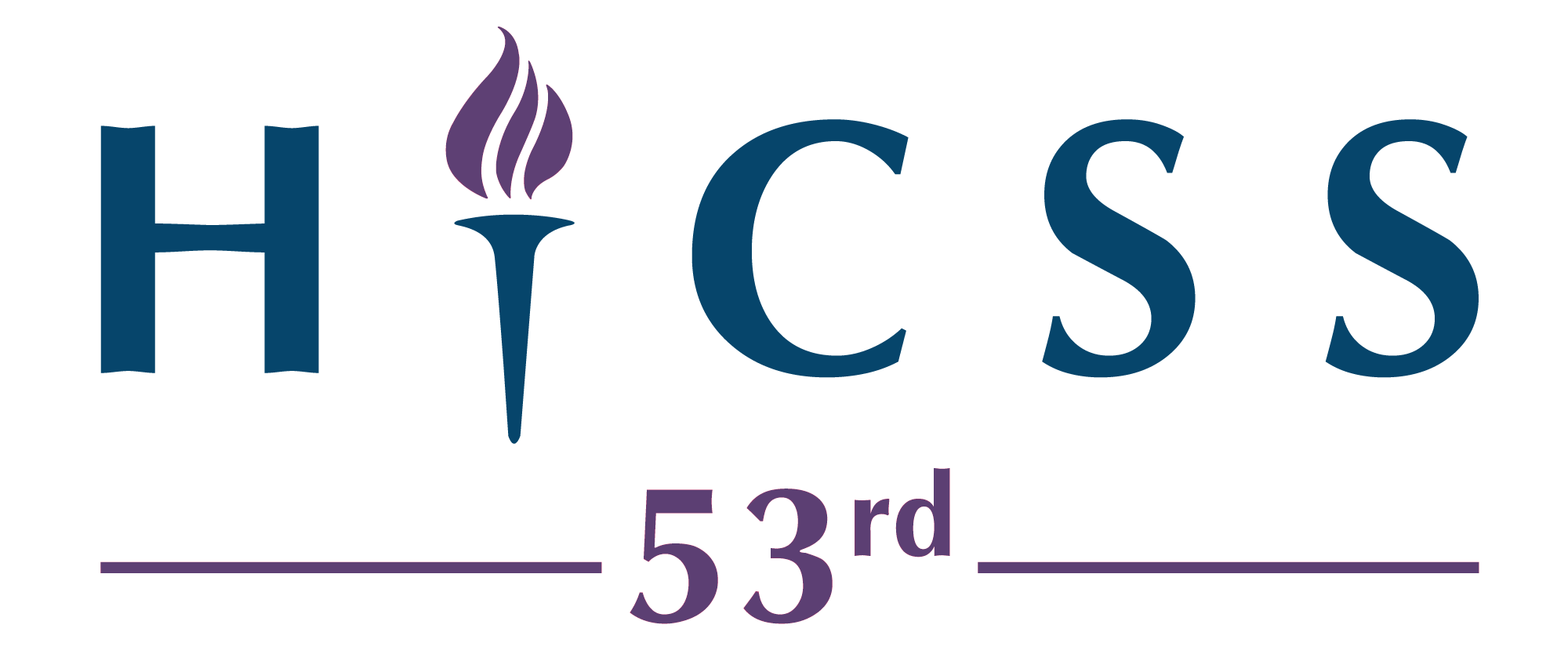HICSS - 53 Digital Government Track
53rd Hawaii International Conference on System Sciences
January 7-10, 2020 - Grand Wailea, Maui, HI, USA
Overview
Minitracks
Tutorials and Workshops
Other Links
Data-driven Government and Artificial Intelligence



Description
Contemporary societies are characterized from the dramatic explosion of digital data (big, open and linked) in the public and private sector. The opening of more and more data and the ability to collect them using low-cost devices enabled by Internet of Things (IoT) constitute a changing force towards data-driven government. Nevertheless, data is useless unless it is used to create value from it. For this, data needs to be shared, processed and analyzed with traditional and advanced methods towards operational and strategic decision-making.
Data-driven government refers to sensing and the subsequent collecting of all kinds of data using machine-readable data formats. This data can be used for internal purposes, but also for opening the data to the public to create transparency, and accountability or to enable participation and even business innovation. Open data can be combined with all kind of data sources to infer and generate value. This can result in recommendations for improving the public sector, business model innovation and the creation of transparency. These developments are resulting in drastic changes of the public sector.
The newest generation of e-government calls for automated and evidence-based decision making and policy support. Artificial Intelligence (AI) and associated algorithms support this new vision of data-driven government dealing with the vast amount of data and their associated devices, such as Internet of Things (IoT) applications. AI techniques have been extensively used to support and enhance the quality of decision making and complex problem solving in different industries for many years through the exploitation of various types of machine intelligence, including natural language comprehension, robotics, expert systems, neural networks and machine learning.
On the other hand, the rise of all kinds of data including text has resulted in the demand for new approaches for organizing, storing, processing, analyzing, curating, linking and visualizing results of data. These approaches all form part of data value chains, which enable data users to extract value from the data. Although there is a huge potential, how the exploiting of data should be accomplished and what is the impact of public organizations is not understood. All these developments impact the operation of governments and their relationship with the public. There are changes at the technical, organizational, managerial and political level that impact the capabilities needed, the making of policies and traditional institutional structures. Moreover, the application of AI in e-government posse numerous ethical and legal considerations. Ethics and responsible research is now of major importance for the utilization of artificial intelligence in e-government that shapes the future of our democratic societies.
This minitrack is aimed at discussing theories, methodologies, experience reports, literature and case studies in the field of Big & Open Linked Data (BOLD) Processing and Analysis through Artificial Intelligence techniques, towards Policy Analytics, automated Decision-Making and Value creation in Government. We solicit for papers covering both organizational and technical aspects and combining theory and practice. Papers taking interdisciplinary approaches and covering a multitude of aspects are strongly encouraged. Furthermore, we promote a diversity of research methods to study the challenges of this multifaceted discipline including best practices, case studies, design approaches, literature reviews and interviews.
Minitrack topics include, but are not limited to:
- Open Data Practices, Technologies and Applications in Government
- Impact of data-driven government and society on the technical, organizational and institutional level
- Big & Open Linked Data (BOLD)
- Government Knowledge Graphs
- FAIR and Linked Data applications
- Metadata and semantic approaches
- Data value, data value chains, and data governance
- Automated decision making using Data Mining, Machine Learning and Artificial Intelligence algorithms
- Extracting value from big data
- Policy analytics, processing and intelligence
- Data-driven strategies and policies
- Data quality, privacy, trust, ownership and security
- Ethical considerations in the application of Artificial Intelligence in Government
- Internet of Things (IoT) for data-driven government
- Changing relationship between government, private organizations and society
- Methods and technologies leading to enhanced digital public services
- Data-driven public sector innovations and applications
- Architectural standards, principles and frameworks
- Technical, semantic, organizational, managerial and legal/policy aspects of interoperability
- System development, implementation and agile approaches for digital public services
- System, user, data and process-based integration
- Co-creation using data and citizen engagement
- Semantic ontologies, web services and modeling for governmental infrastructures
- Data platforms, interoperability, information sharing and public business models
- Citizen-driven and entrepreneurial approaches based on open data
- Adoption, failure and success factors and organization of a data-driven government
Minitrack Leaders
Charalampos Alexopoulos is a visiting professor at the Department of Information and Communications Systems Engineering of the University of the Aegean, teaching e-government interoperability and information systems management. He has published in numerous international conferences and journals on open data quality, evaluation and infrastructures; decision support systems and artificial intelligence in e-government and smart cities. Charalampos is also a Senior Scientist at the Information Systems Laboratory conducting research on various European and National funded research and pilot application projects on open data (ENGAGE, SHARE-PSI 2.0), semantic and organizational interoperability (PLUG-IN) and text and data mining for decision support (EU-COMMUNITY, PADGETS, NOMAD) and legal information analytics (ManyLaws). Charalampos serves as a track (co-)chair in the MCIS, EGOV, ICDS, ICEDEG and ICEGOV international conferences as well as a Programme co-chair in the annual Samos Summit on ICT-enabled Governance. He is currently the project manager of the Gov 3.0 project "Scientific foundations, training and entrepreneurship activities in the domain of ICT-enabled Governance". More information at: https://gr.linkedin.com/in/xalexopoulos
Erwin Folmer is research associate at the Industrial Engineering & Business Information Systems department at the University Twente. Before that, he worked as senior scientist on the topic of interoperability and standards. From 2009 he part-time joined the University of Twente to start a PhD research on the standardization topic, while continuing his work for TNO. In 2012 received his PhD based on the "Quality of Semantic Standards" thesis. In 2013-2014 Erwin was visiting researcher at ERCIS/University of Munster. From 2015 onwards Erwin joined Kadaster, the Dutch land registry mapping agency. Erwin also leads the Platform Linked Data Netherlands; an open community on Linked Data knowledge exchange and implementations. https://www.linkedin.com/in/erwinfolmer
Thomas Lampoltshammer is Assistant Professor and Deputy Head of the Centre for E-Governance in the Department of E-Governance and Administration at the Danube University Krems/Austria. Prior to his current position, he worked as a researcher and lecturer in Applied Informatics in the School of Information Technology and Systems Management at the Salzburg University of Applied Sciences Salzburg/Austria. His research interests include, but are not limited to, Geoinformatics, Semantics, Open Data, Data Visualization and Software Engineering. His project experience as PI includes EU-funded research projects and national grants in the domain of data management, organizational theory and ICT in public administration. He is co-founder and co-chair of the International Data Science Conference (iDSC) series,;as well as member of the ICA Commission on Cognitive Issues in Geographic Information Visualization. Besides, he acts as reviewer for several international conferences as well as for numerous SCI-indexed journals.His current research focus is in the domain of open data, the effects of ICT application in a connected society and the effects on a data-driven society.
Co-Chairs
Charalampos Alexopoulos
(Primary Contact)
Information Systems Laboratory
Dept. Information & Communication Systems Engineering
University of the Aegean
30 Voulgaroktonou st., Athens, GR-11472, Greece
Email: alexop@aegean.gr
Erwin Folmer
Dept. Industrial Engineering & Business Information Systems
Dept. Information & Communication Systems Engineering
University of Twente & Kadaster
Drienerlolaan 5, 7522 NB, Enschede, The Netherlands
Email: erwin.folmer@utwente.nl
Thomas Lampoltshammer
Department of E-Governance in Economics and Administration
Dept. Information & Communication Systems Engineering
Danube University Krems
Dr.-Karl-Dorrek-Straße 30, 3500 Krems, Austria
Email: thomas.lampoltshammer@donau-uni.ac.at
